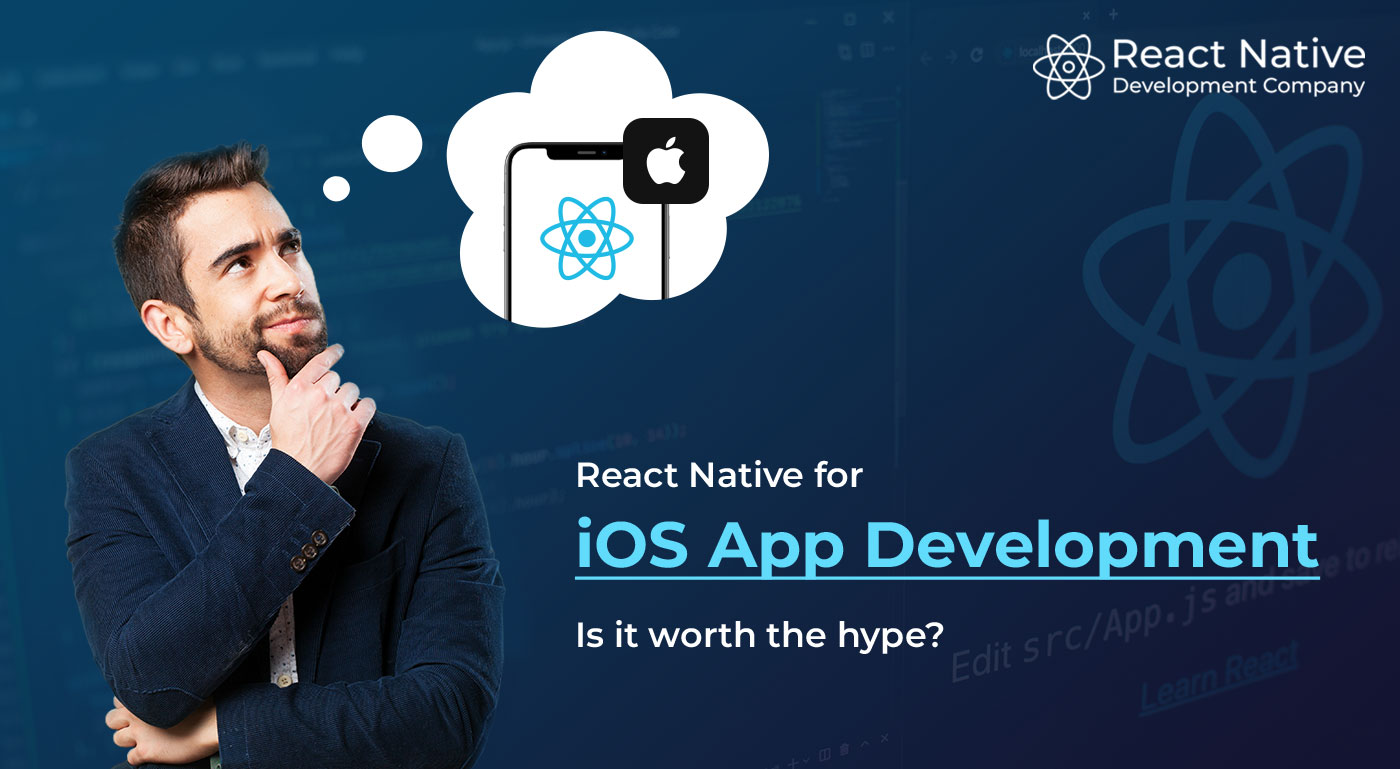
React Native For iOS App Development : Is it Worth the Hype?
Is React Native suitable for iOS App Development in 2022?
What’s common on Pinterest, Facebook, and Instagram?
Did you answer — “Well, they are all social media?”
Yes, but they have something else in common, which many people are unaware of. These leading social media apps are built on the React Native platform!
So, it’s not a shocker that React Native, an open source framework, is the talk of the town. After all, there must be some reason why the world’s global tech giants and several existing apps are moving to React Native.
This Blog Will Discuss:
1. What’s React Native? Is it worth the hype?
2. Is React Native good for iOS Development?
3. Why should Startups choose to React Native for iOS mobile development?
What is React Native? Why Is It Growing In Popularity?
Google Trends React Native Graph
React Native is an open-source framework that relies on JavaScript to build web applications and software development. It’s famous for its tagline, “Learn once, write anywhere.” Built by Facebook, it’s a fantastic cross-platform framework that allows developers to use a single code base for multiple platforms.
But Why Was React Native Built?
Facebook struggled to maintain two separate code bases for its mobile app. For every new feature they tested or launched, they had to make changes to Java in Android and Swift in iOS.
This slowed down the progress and led to duplication of work. With React Native, Facebook works only with JavaScript, so developers can write once and deploy changes everywhere.
The Popularity Of React Native

- According to Statista, React Native is the 2nd most famous cross-platform development framework, with a 38% market share.
- According to StackOverflow, 57.9% of developers showed interest in React Native.
Is React Native Good For iOS App Development?
This section will examine a few criteria to understand what React Native offers for iOS app development.
| Criteria | React Native | Remarks |
| Testing | React Native offers many app testing methods to cover different test levels. It also supports popular test automation frameworks to test iOS apps with XCTest and Jasmine — the iOS functional testing. They can perform
|
Good |
| Third-party libraries | The constantly growing RN community has led to the development of several third-party libraries and APIs. These libraries assist in iOS app development.
The best thing about React Native is that libraries that engage native code are linked automatically in the framework. |
Good |
| OTA Updates | Apple Store policy doesn’t approve of over-the-air updates. However, when using React Native, app owners can push minor OTA updates to the app without going through the entire cycle of app resubmission on the Apple Store. | Average |
| Maintenance | Unfortunately, when it comes to maintenance, React Native lags behind. So, when the new framework is released, developers must go through the code and check whether each library and API is compatible with the new version. That’s a huge pain, especially if the app is significant. |
Poor |
| Security | In React Native, data is stored with AsyncStorageAPI. However, the drawback is that Asyncstorage is not encrypted and operates globally. So, the security is no match with Apple’s native security. | Poor |
| UI | Since React Native renders the native iOS components; the UI closely matches the native iOS UI. Another advantage of React Native is that it comes with ready-made UI components, so in some cases, it can save developers from creating UI components from scratch. | Good |
| CI/CD support | Unfortunately, React Native has no good solution for CI/CD. So, if you want to automate the delivery, you will use third-party solutions. Most developers leverage Bitrise, Fastlane, and CircleCI to CI/CD in React Native. | Poor |
Which Brands Are Using React Native for iOS App Development in 2022?
#1. Facebook
Facebook knew it had to be faster if it wanted to stay competitive in the social media market. Thus, their team decided to work on React Native. The results were better than before!
- The app ran faster than built, and the content loaded quickly.
- It also witnessed the meteoric rise in the speed of dashboard startup time.
#2. Bloomberg
In 2016, Bloomberg decided to build a React Native mobile app for their website. The end goal was to provide easy access to personalized content. The company also wanted to provide an interactive user experience (UI UX) and user interface using live video feeds and libraries.
The result was better than expected:
- The team was able to test new features quickly to improve the user experience of the native mobile application.
- The app reloads quickly.
#3. Walmart
Walmart is an eCommerce giant with a group of several brands like ASDA, Sam’s Club, Walmart grocery, and others. Each brand has its own IT requirement, making mobile development more complex.
Until 2016, Walmart simply embedded web views on mobile apps, severely affecting their performance. However, once they shifted to React Native, the results were astounding:
- User experience improved as React Native app yielded smooth and native-like UI.
- They were able to share 95% of the codebase between Android and iOS apps.
- Walmart also highlighted that they needed only a JavaScript development team to develop their mobile app and launch it on the App Store.
These are just a few examples of companies leveraging the power of React Native. Several global giants, including Vogue, Shopify, Pinterest, Salesforce, Skype, and Wix, have built their iOS apps on React Native, thanks to its robust features.
Startups and React Native: The Best Duo
Unlike established businesses, things move fast, like real fast in startups. There’s no room for mistakes when it comes to launching their mobile applications. Startups have different needs from established businesses like
- Work with tight deadlines: Startups move quickly, which means strict deadlines. As a result, there is less or no wiggle room to make mistakes. Each mistake can take the startup near failure.
- Need for faster iteration: Startups cannot wait for years to launch react native applications. They need to test faster and launch faster to generate revenue.
And that’s what makes React Native a perfect companion for startups. It fulfills all the conditions that startups need to grow.
Building iOS Apps With React Native Can Benefit Your Startup in many ways like
- Faster time to market: Pinterest managed iOS app development in 10 days and launched it to public users! Like Pinterest, startups need to launch the app quickly and start testing; React Native is the best bet here.
- Hot Reloading: Hot Reloading is the ability to inject new code into the source course while the app runs. This means you don’t lose the state. The app reloads automatically when code changes, thus accelerating the development time.
- Supports third-party plugins: Due to limited time and resources, startups do not have enough time to code a new function from scratch. That’s when already established third-party plugins come to the rescue. So, for instance, if you want to enhance your app’s main functionality, you can simply use a third-party plugin instead of coding from scratch.
When To Choose React Native to Develop iOS apps?
You may vouch for using or not using React Native for iOS app development, but we have highlighted the main points to help you choose. Let’s get started:
Use React Native For IOS Mobile Development If…
#1. If You Don’t Know Your Target Audience:
Most startups and sometimes even growing companies don’t know their target audience and hence fail to increase their ROI. Then another problem is startups are always confused about what platform to choose, Android or iOS.
In such cases, React Native allows startups to focus on both platforms equally and then find their target audience.
2. Cost Efficiency Is a Priority
Not all businesses can afford two separate mobile apps and development teams for iOS and Android. Moreover, even if the aim is to develop an iOS mobile app, the native iOS app development cost can be much higher than building a React Native app.
Why?
Because native iOS app developers are fewer, finding the best suitable match can take months. The cash-crunched startups and small businesses neither have a budget nor have time to wait longer to build the app.
At such time, React Native allows them to launch in both the iOS and Android markets to stay competitive.
You Shouldn’t Use React Native For iOS Development If:
Despite its advantages, React Native is not a perfect, one-size-fits-all framework. This means there are circumstances where React Native shouldn’t be used for iOS app development.
#1. Applications With Complex Interfaces
React Native is not the framework for creating complex interfaces, regardless of how many pre-made UI components it offers. Building iOS apps with RN would be disastrous if the app required complex gestures, heavy animations, or hardware features like the camera, touch ID, GPS, etc. For iOS app development Swift and other native development frameworks are better choices for creating complex interfaces.
#2. Your App Is Explicitly Created for iOS
Piggybacking on the previous point, if your main goal is to make an iOS-centric app, it’s better to use a create react native app.
Remember, React Native is known for its “cross-platform” features.
So, unless you plan to move to react native Android apps in the future, it won’t serve the purpose. No matter how much effort your developers put in, React Native web apps will always feel inferior in quality due to missing native functionalities and user experience.
Read also about Why Would You Build An App On React Native Over Swift?
Final Takeaways
- We are using React Native apps (Hello, Facebook, and Pinterest) without even knowing.
- In the end, you work with JavaScript when developing IOS apps with React Native Components. So, you don’t need specialized Swift or iOS developers to build apps.
- React Native and native APIs are growing each day, showing no time to stop soon.
There are umpteen benefits of iOS development using React Native. So, now that you know that React Native is right for iOS apps, it’s time to search for a reliable React Native app development company to turn your dream app into reality.
Hire React Native App Development Company For Your Next Project
Here, we provide React Native app development services to help you build an IOS app. Drop us a message here — We will be thrilled to help you!
FAQ:
1. Can you build an iOS app with React Native?
Yes! React Native is a cross-platform app development framework that works on most ecosystems.
2. What are the benefits of React Native app development?
React Native app development has several benefits, including
- Low cost of development
- Faster time to market.
- Availability of third-party plugins
- Large community support
3. How much time does it take to develop an iOS app from React Native?
It depends on several factors as they decide the time taken for iOS app development with RN. However, a simple iOS app can be built as fast as 10 days, whereas complex apps can take anywhere between 1.5 months to three months.
